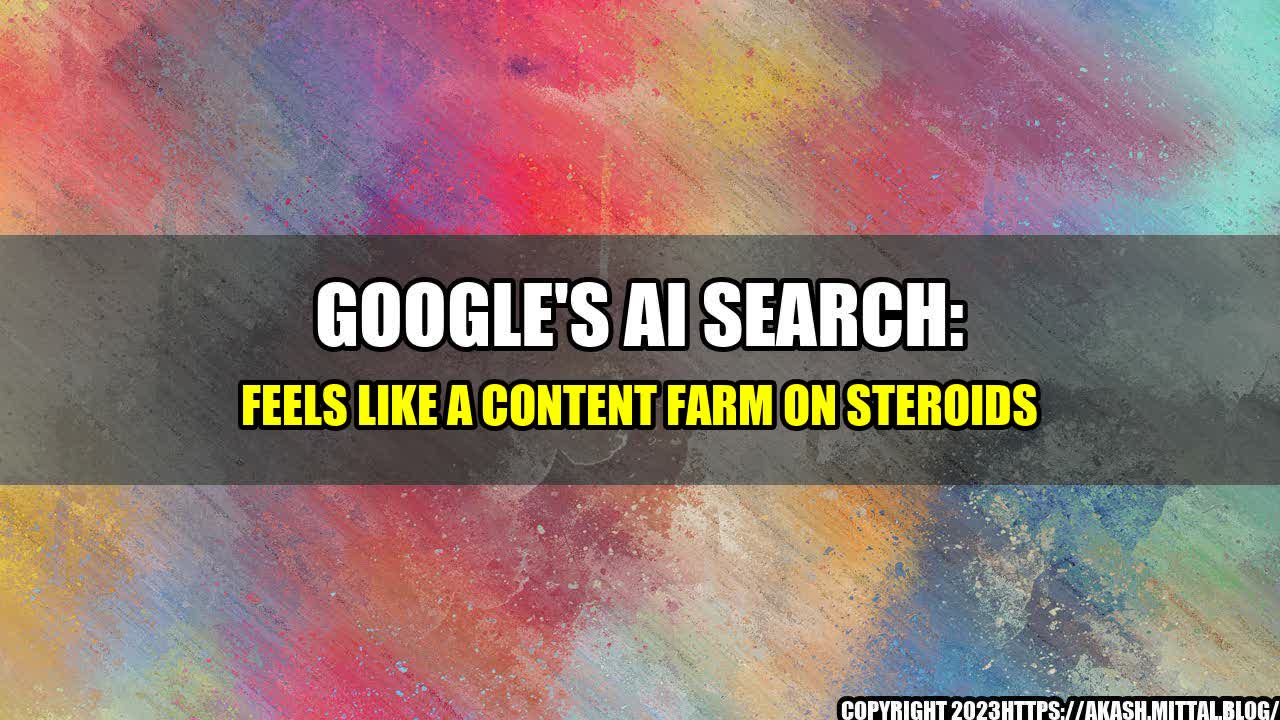It's hard to imagine life without Google. It has revolutionized the way we search for information, making it easy to find answers to our most pressing questions with just a few clicks. However, in recent years, there has been growing criticism of Google's AI-powered search, with some experts likening it to a "content farm on steroids."
What is a Content Farm?
A content farm is a website that churns out low-quality, SEO-optimized content in large volumes, with the sole purpose of attracting traffic and generating ad revenue. These websites often use keyword stuffing and other shady SEO tactics to rank high in search engine results pages (SERPs), despite providing little value to readers. They are generally viewed as a scourge on the internet, by both users and legitimate publishers alike.
What's Wrong With Google's AI-Powered Search?
Google's search algorithm has always been a closely guarded secret, but in recent years, the company has been increasingly open about its use of artificial intelligence (AI) to deliver search results. While AI has undoubtedly improved the speed and relevance of Google's search results, it has also had unintended consequences.
Unintended Consequence #1: Ranking Low-Quality Content
One unintended consequence of Google's AI-powered search is that it has made it easier for content farms to prosper. By analyzing user behavior and preferences, Google's AI is able to identify and rank content that is most likely to satisfy a user's search query. However, this also means that it is more likely to rank low-quality content that is designed to manipulate search engines, rather than provide valuable information to users.
Example:
A search for "How to lose weight fast" returns over 3 billion results on Google. Most of these results are from content farms that provide generic advice like "Eat fewer calories" and "Exercise more." While this information is technically correct, it provides little value to users who are looking for more personalized and helpful tips.
Unintended Consequence #2: Promoting Fake News and Misinformation
Another unintended consequence of Google's AI-powered search is that it has made it easier for fake news and misinformation to spread. By analyzing user behavior and preferences, Google's AI is able to identify and rank content that is most likely to be clicked on and shared. However, this also means that it is more likely to rank sensationalist and inaccurate content that is designed to attract clicks and shares, rather than provide accurate information to users.
Example:
A search for "COVID-19 vaccine" on Google returns a mix of accurate and inaccurate information, with articles from reputable sources like the Centers for Disease Control (CDC) sharing space with conspiracy theories and false claims from unknown sources. This can be dangerous, as it can confuse users and lead them to make decisions based on false information.
Unintended Consequence #3: Decreasing Diversity of Opinion
Finally, another unintended consequence of Google's AI-powered search is that it can decrease the diversity of opinion. By analyzing user behavior and preferences, Google's AI is able to identify and rank content that is most likely to be clicked on and shared. This means that sites that already have a large following are more likely to be ranked higher, while smaller and lesser-known sites are pushed down the rankings, making it harder for them to gain visibility.
Example:
A search for "climate change" on Google returns a mix of articles from mainstream media outlets like The New York Times and The Washington Post, but it also pushes down the rankings for alternative perspectives on the issue from less well-known sources. This means that users who are looking for a diverse range of opinions on the issue may not be able to find them as easily as they should be able to.
Conclusion
- Google's AI-powered search has unintended consequences that can harm users and smaller publishers.
- These consequences include ranking low-quality content, promoting fake news and misinformation, and decreasing the diversity of opinion.
- As such, it is important for Google to constantly evaluate and refine its search algorithm to ensure that its AI is promoting high-quality and accurate content, while also encouraging diversity of opinion.
While Google's AI-powered search has undoubtedly improved the speed and relevance of search results, it also has unintended consequences that can harm users and publishers. It is up to Google to ensure that its algorithms are promoting high-quality and accurate content, while also fostering diversity of opinion. By doing so, Google can continue to be a valuable resource for information and knowledge, while also staying true to its founding principles of "Don't be evil."

Curated by Team Akash.Mittal.Blog
Share on Twitter Share on LinkedIn